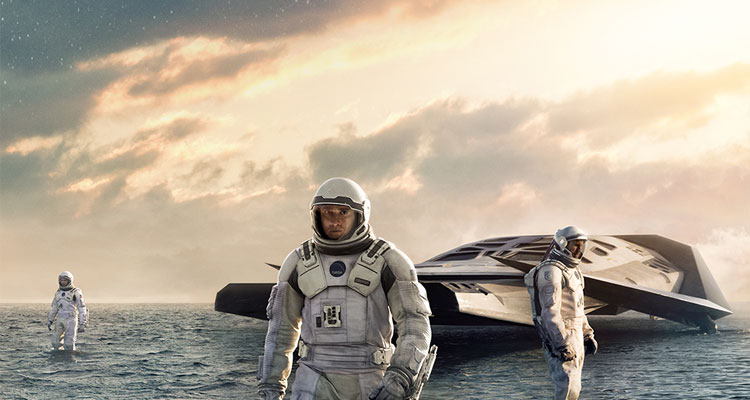Christopher Nolan’s latest film, Interstellar, features stunning visuals and a story that’s both original and reminiscent of classic space epics, particularly 2001: A Space Odyssey.
Movie Details:
Director: Christopher Nolan
Stars: Matthew McConaughey, Anne Hathaway
Rating: PG-13 for some intense perilous action and brief strong language.
Duration: 169 minutes
Release day: November 7, 2014 (35mm screenings begin November 4, in select cities)
What’s Interstellar about?
The film opens in a bleak, dystopian world that’s being starved by a blight. We’re never explicitly told what happened in this not-too-distant future, but crops are dying, people are starving, massive dust storms sweep through regularly, and suffocation is a looming threat as the level of oxygen in the air decreases, and nitrogen increases due to the blight (some kind of unnamed organism).
Cooper (Matthew McConaughey) is a struggling farmer trying to eke out a living with his father-in-law (John Lithgow), and his son and daughter, Tom and Murph. A former engineer and pilot, he discovers his former mentor, Brand (Michael Caine) is leading the last scientists at NASA in a race against time to find a new planet that can support life and save humanity. With Brand’s daughter, Amelia, (Anne Hathaway) Cooper embarks on a mission to another galaxy through a wormhole (which theoretically could shorten huge distances of spacetime). The crew is following in the footsteps of a previous mission which may have identified planets capable of sustaining a human colony, whether that means a migration of humanity to the new planet, or a new population grown from a batch of fertilized human eggs.
Is there profanity, violence, or explicit content?
There are two uses of the F-word, and a few instances of “sh**” and “da**”. Main characters die, although these deaths are not graphic or bloody. There are scenes of intense, edge-of-your seat action, explosions, and characters in life-threatening situations. There are also some emotionally intense scenes that young or sensitive kids may find troubling. The film’s PG-13 rating seems suitable, and kids much younger than that are unlikely to enjoy it anyway.
Does Interstellar have educational value?
It may, actually. Nolan worked with theoretical physicist Kip Thorne on the film, and apparently much of the science as it relates to quantum physics is accurate. There is some content that is less scientifically accurate. For instance, the idea that, like gravity, human love can transcend dimensions is a bit more Fifth Element than Cosmos. But especially for kids who love science, the film could certainly spark an interest in astrophysics, relativity, and quantum mechanics.
While the first two-thirds of the film are much more “epic space opera,” the last third brings to mind Madeleine l’Engle’s Wrinkle in Time series, with talk of tesseracts and dimensions beyond those we’re aware of. Kids who like l’Engle’s series, or other time travel stories like Doctor Who, may enjoy comparing and contrasting elements of Interstellar to other stories that deal with time travel and relativity.
And for kids fascinated by space and science fiction, who have seen and enjoyed other films like Gravity, 2001, and Contact, they’ll probably like Interstellar, and may even be able to pick out some of the tropes and themes that run through Interstellar and other space movies.
I would also recommend reading the entirety of the Dylan Thomas poem that echoes (a bit too often in my opinion) throughout the film. Ask kids: Why do you think “Do Not Go Gentle into That Good Night” is featured throughout the film? How does the film echo the themes in the poem?
Finally, if your child is interested in film making or film history, some screenings of Interstellar offer a rare opportunity with screenings of 35mm and 70 mm prints, rather than the usual digitized version. I was lucky enough to see it a few days early on 35mm—a format Christopher Nolan is heavily involved in preserving—and would certainly recommend the experience to other film buffs.
The bottom line
Beneath all the special effects, at it’s core, Interstellar is about love and family. Specifically, a father’s love for his children that sends him across the universe (and beyond) knowing full well that—due to the time-distorting effects of relativity—he will likely not be back on Earth in their lifetimes, if at all. Still, he will stop at nothing to try to come back to them.
It’s an ultimately positive message, and while aspects of the movie may be too long, boring, complicated, or scary for younger kids, older tweens and teens will likely enjoy both the science fiction, space opera elements and the family bond at the movie’s heart.
Do you plan to see Interstellar or have you already seen it? Leave us your thoughts on the movie (or our review) below.
Click here for more Learning Liftoff Movie Reviews
Image Credit – Twitter @InterstellarNow / Twitter Fair Use




































